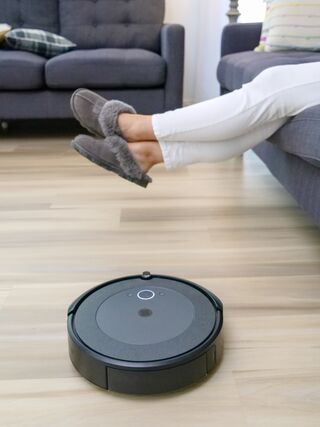Stress
What I Learned About Self-Compassion From My New Vacuum
Bet you didn't know you could learn important life lessons from a Roomba vacuum.
Posted October 14, 2021 Reviewed by Jessica Schrader
Key points
- Learning to be kind to yourself isn't that hard, despite what you might think.
- Self-compassion is linked in research studies to lower depression, anxiety, and stress.
- Life lessons are all around you—being mindful and aware allows you to open up to these lessons.

Who would have thought I could learn about self-compassion—and life—from my new vacuum cleaner? Seriously?
Truthfully, I was initially resistant to getting one of those Roomba vacuum cleaners. Who needs one, I thought. I’ve got a decent vacuum, and besides, vacuuming is one chore I don’t mind so much. But my friends impressed upon me the joys of reading a good book while your Roomba was scurrying around your floors, and then there was a sale, and who can resist a bargain, right? I succumbed.
Little did I know how much my life would change, and how much I would learn from observing Ira—our new iRobot Roomba—do its thing. There are so many life lessons I learned from Ira, but here are just a few:
1. When you’re tired and need to recharge, take a break. No matter where Ira is, whether he’s halfway down the hall or in the middle of the living room, he stops dead in his tracks, turns around, and heads for his charging station. Doesn’t look back, doesn’t wait for a “good stopping place,” doesn’t say “just one more sweep-through.” Just stops and heads home to rest.
2. When you’re at your limit, call for help. When Ira’s bin is full, he stops, makes a particular beeping noise, so we know to come and empty his bin. He doesn’t try to empty his bin himself, or try to stuff some more crap in his bin. When he’s full and knows he needs help, he calls his loved ones—us. And we’re there.
3. There’s more than one way to get from point A to point B. So be yourself and do it your own way. You may have been taught that the best way to accomplish a task was to be systematic, make an outline, start at the beginning, and then go to the end, right? That may work for some tasks, some of the time. But ha! Ira has thrown that theory out the window. He has shown that there is no one right way to accomplish a task. Ira’s creative with his cleaning. He wanders all over the place. He may work on the office floor for a while, and then wanders over to the bedroom, and then comes back to do part of the kitchen. But in the end, he gets it all done. And it looks great.
4. Go slow. There’s really no rush. We have a whole lifetime, and there are always more tasks. Ira took nine hours to vacuum our house the first time, and trust me, our house isn’t so big. Now he gets it done in three and a half hours, but in that time, rests for four and a half. Yes, you heard that right. Works for three and a half hours and takes four and a half hours’ worth of breaks during that time. Nice ratio, no?
5. There’s way more crap down there than meets the eye. Whoa, baby, were we surprised after Ira’s first trip around our house. And I thought I was doing a good job vacuuming. It’s like when you go to a therapist to work on one minor issue that’s come up at work, and in no time you’re talking about when you were 6 and you were bullied by a neighbor kid. Things are always more complicated than they seem.
6. If you miss something the first time around, no worries. There’s no need to be perfect—perfection is highly overrated. And besides, there’s always another chance to come back around and fix whatever you missed. Ira misses spots all the time the first time through a room. He comes back later and scoops up that clump of dust under the chair.
7. When you’re stuck, call for help. When Ira gets stuck, does he struggle for hours trying to figure it out on his own? Does he relentlessly beat himself up for getting stuck in the first place? Does he think of all the things he should have done not to get himself there? Not Ira! Call him “No-ego Ira.” He reaches out and sends a text. I’m not making this up. I get a text saying “Help! My right wheel is stuck!” And there I am, ready to lend a hand. He doesn’t get all wrapped up in whether he’s imposing on me, or how many times he’s asked me for favors, and if the number of times we’ve helped each other out are equal. He doesn’t feel guilty for asking me to help. If he’s in some corner of the house somewhere and gets himself wrapped up in the fringes of a rug or stuck under a sofa, he sends a text, and that’s it. End of story.
8. There will always be obstacles—it’s what you learn from them that matters. You can continually hit your head against the trouble spots in your life—making the same mistake over and over again—or you can figure out where they appear and go around them next time. Ira learns where the table legs and door frames are by bumping into them, sometimes repeatedly, and the next time out he avoids them.
9. When faced with potential adversaries that want to bring you down, ignore them. Ira frequently encounters a puppy that wants to play with him, throwing a toy right in his path, or an aging cat that’s ready to pounce. He remains unfazed, focused, mindful, and simply continues on his way. Being reactive is simply not in his system.
10. When you finish a long and arduous task, celebrate. Ira shouts out a gleeful little series of tones when he’s done cleaning.
Watching Ira on his journey around the house is such a learning experience. No wonder I’m not getting my work done.




